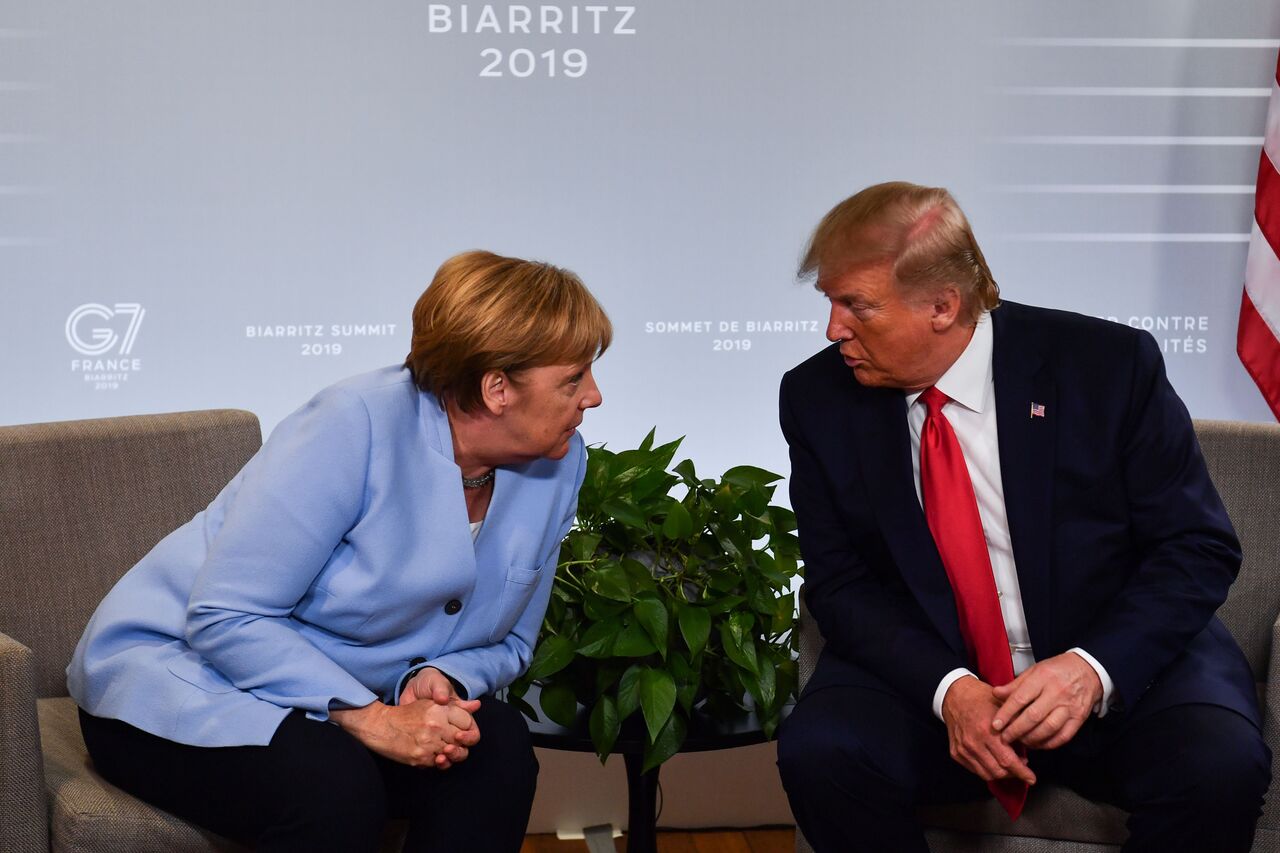Trump catches Merkel off guard with decision to pull 9,500 troops from Germany
Sign up now: Get ST's newsletters delivered to your inbox

German Chancellor Angela Merkel with US President Donald Trump during a bilateral meeting in Biarritz, France, on Aug 26, 2019.
PHOTO: AFP
BERLIN (BLOOMBERG) - German Chancellor Angela Merkel was caught off guard by US President Donald Trump's decision to pull 9,500 US troops out of Germany by September.
The government wasn't officially notified by the United States about Mr Trump's plan, and it has so far found out about the matter only from media reports, a German government official said on Saturday (June 6), declining to comment further.
The decision to pull more than a quarter of US troops out of Germany comes after years of tension between the US and Chancellor Angela Merkel over her country's military spending. The change has been discussed within the Trump administration since last September and reflects increases in military outlays by US allies that allow for such cuts, a person familiar with the matter said, asking not be identified.
"These plans demonstrate once again that the Trump administration neglects a central element of leadership: the involvement of alliance partners in the decision-making process," Mr Johann Wadephul, deputy leader of Dr Merkel's CDU-led caucus group, said in an e-mailed statement on Saturday, complaining that the US hadn't notified the German government before the decision.
"For us Europeans, this is one more wake-up call to take our destiny with regard to security policy more decisively into our own hands."
From the US point of view, the troop withdrawal would make sense, another German official said under the condition of anonymity. Germany is no longer on the front line like during the Cold War, but has instead become a hub for US operations in the Middle East. The US would therefore most likely not withdraw all of its troops, but only ones who are no longer needed.
The cut, reported earlier by the Wall Street Journal, would reduce American troop strength in Germany to 25,000 permanently assigned service members, compared with about 34,500 now, the person said. Dr Merkel's decision to stay away from a Group of Seven meeting that Mr Trump had planned to host in Washington this month had no influence on the planned pullout, the person said.
A White House National Security Council spokesman, Mr John Ullyot, said that Mr Trump "continually reassesses the best posture" for US forces and their overseas presence. The US is "committed to working with our strong ally Germany to ensure our mutual defence" and other matters.
Dr Merkel and Germany have been a prime target of Mr Trump's push to shift more defence spending to North Atlantic Treaty Organisation allies, which he has, in effect, accused of freeloading off US military power.
In April 2019, he struck a more conciliatory tone. "We've picked up over US$140 billion (S$195.3 billion) of additional money, and we look like we're going to have at least another US$100 billion more in spending" in 2020 by Nato members, excluding the US, the president said at the time.
Mr Trump also warned Germany in December that while it was coming along on increases in defence spending, he might take action related to trade with Europe if Dr Merkel's government didn't do more to reach Nato members' agreed goal of spending 2 per cent of gross domestic product on their military.
Dr Merkel's defence minister, Ms Annegret Kramp-Karrenbauer, said in November that Germany wouldn't meet the Nato benchmark until 2031 because of a lack of military personnel.
Historically one of America's most loyal allies, Germany is still home to the biggest US contingent in Europe and hosts key overseas installations such as the Ramstein Air Base and the Landstuhl Regional Medical Center.
"Everybody profits from the cohesion of the Nato alliance, only Russia and China benefit from dispute," Mr Wadephul said.


